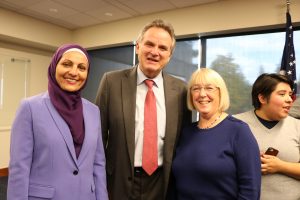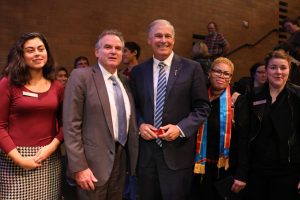Since his official start date in August, Dr. Jerry Weber has been engaged in what can only be described as a whirlwind of activity at both the college and greater Eastside community. Here’s a quick-glance of just a few of the places, and people, he’s been engaged with, why he’s dedicated his career to community colleges, and how the role of college president is in a near-constant state of evolution.
Q&A with Dr. Weber
Why focus your career in community colleges?
Well I got my start as a writing instructor teaching developmental communications in composition at William Rainey Harper College, and I was struck by the success of the community college model. We talk a lot about the American Dream and how we’re a society where anyone who works hard can improve their lives. The reality is that kind of social mobility is not always so easy, or accessible. Except in community colleges. It really is a unique American invention that brings higher education to local communities.
I taught such a diverse group of students who wouldn’t have been able to afford a college degree otherwise – folks who didn’t speak English as their first language, women entering the workforce for the first time (this was back in the late 70s, early 80s), and people who needed a second chance. And it worked. We gave them the skills and certificate they needed, and they were able to get jobs in the local community. I realized that community colleges were an engine for social justice, and I was proud to be a part of that mission. I guess you could say I was hooked, and I still am.
What’s been the biggest shift in higher education?
Even though research points to the value of a college degree over the course of a career – the latest Georgetown University study reported that college graduates earn on average $1 million more than those with just a high school diploma – people are questioning the cost of tuition, particularly at private institutions.
At the same time, we’re seeing a resurgence of folks reaffirming the value of community colleges. A recent New York Times article, Middle-Class Families Increasingly Look to Community Colleges, focused on families that were able to save a lot of money on the first two years of higher education at community colleges. A good third of our students intend to transfer, and enrollment in our Running Start program, which offers dual college and high school credit, is soaring.
Also the applied baccalaureate degrees increasingly being offered by community colleges is a huge shift. It makes sense since more jobs require a four-year degree, and the applied focus of our curricula gives students hands-on skills that employers are looking for.
How has the role of president changed?
As state support has decreased – and this is nationally, not just in Washington – colleges have had to adapt to a more entrepreneurial model. I think that one of the president’s roles is to stay current with leadership and organizational change techniques to help facilitate the financial stability of the college without losing sight of the mission.
I was lucky enough to participate in a seminar at Harvard University on organizational change theory and adaptive structures, and I learned so much from my discussions with the professors there, as well as other business and nonprofit leaders from all over the world that it changed my thinking entirely.
It made me reassess how institutions can tap into the rich ideas and knowledge-base of colleagues, bring together a broad array of initiatives that folks are trying out in different departments, and create a unified approach. At the College of Lake County, we were able to accelerate positive change using a shared governance structure, while maintaining the core mission and values of the college. Because at the end of the day, we’re here to serve students. When you have student success as your compass, you’re helping the institution be successful too.
Dr. Weber Fast Facts
- Former President of: College of Lake County Kankakee Community College.
- Moved here from: Chicago.
- Passionate about: Student success, equity and diversity, sustainability.
- Notable Achievements:
- Elected to the board of directors of the American Association of CommunityColleges
- Founding chair for the Sustainability Education & Economic Development (SEED) Center
- Degrees:
- Ph.D. in higher education administration, University of Iowa
- M.A. in educational measurement and statistics, University of Iowa
- M.A. in linguistics and English literature, Northern Illinois University
- B.A. in English, Northern Illinois University
- Enjoys: Avid podcast listener to shows like The James Altucher Show, TED Radio Hour, Revisionist History with Malcolm Gladwell
Related Articles
College Is Worth the Cost. Here’s How Schools Can Prove It.
Middle-Class Families Increasingly Look to Community Colleges
Last Updated August 28, 2019



